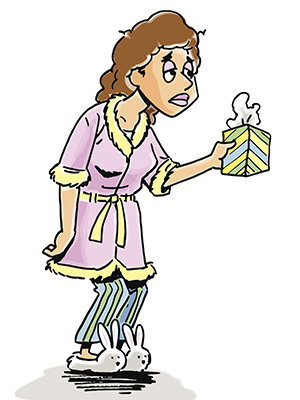Dear Dr. Debbie,
We’re only halfway through winter and our three-year-old has had pink-eye, Covid-19, a stomach virus, and the usual drips and sneezes from being around other children for the first time.
If I’m sick at the same time, which has happened several times, how much should I be expected to cater to her middle of the night calls, special requests for foods, and general hanging on me all day long?
Personal Care Nurse and Sometimes Patient, Too
—
Dear PCNaSPT
When a child is sick her needs are amplified. Care for a sick child should include some changes in normal caregiving. Ask for help from other family members if you are sick at the same time. (Professional in-home services for cooking, sick childcare, and housekeeping are another option. Be sure to use precautions against further spreading the germs.)
Hold Me
You know you have an unwell child if she hangs on your leg when you try to move about the house. Your “clinging vine” doesn’t feel whole without you. Clinging may accompany illness in a child of any age.
A touch, a caress, a gentle massage, all have healing powers. Pressure receptors in the skin send messages to the brain to lower cortisol – the stress hormone, and to increase serotonin – the calming hormone. Both parties also get a boost in oxytocin – the “love” hormone that increases feelings of attachment.
Furthermore, massage stimulates glands to release white blood cells into the body’s circulation. White blood cells are the enemies of invading viruses and bacteria.
So go ahead and snuggle. You’ll both feel better.
Bring Me
Depending on the illness, specific food and drink are recommended. Water is always a good idea. Ice water can soothe a fevered head. Warm water soothes a scratchy throat. Sips of water prevent dehydration during a bout of nausea. Likewise diarrhea requires refilling the body with liquids. Watered orange juice adds some vitamin C which further assists the body in recovering from germs. Offer warm (un-caffeinated) tea that is minty or fruity to help thin the mucous of a stuffy nose.
Relax your rule about no food and drink in bed in order to increase your young patient’s intake of liquids and nourishing food. The immune system does its best work when the body is at rest, so staying in bed, or at least camping out on the couch for the day, will support this.
She may not feel like eating much if she’s not moving around much, so choose healthy foods that she can nibble on. Does she have a favorite soup? Would she like small pieces of fresh or frozen fruit? Temporarily throw out your carefully crafted schedule of mealtimes and snack times to answer her calls for a little bit of this or that at any time of day or night. You’ll know she’s returning to health when her requests for food increase!
Ask the doctor or pharmacist about food and drink interactions when “ooey” tasting medicine must be taken. Maybe a spoonful of something sweet can help the amoxicillin go down.
Tolerate Me
One early sign of oncoming illness is that a normally agreeable child becomes disagreeable. A young child is naturally self-centered, but when she doesn’t feel well she is even less concerned with the needs and feelings of others. Being selfish and supersensitive are natural defenses as the body tries to get the extra attention it needs for care and recovery.
Change your expectations. Adjust your reactions.
If you don’t normally let your child sleep with you, when she is delirious with fever you may want to keep close through the night. Even minor discomforts are suffered more sweetly when Mommy or Daddy snuggles close. If you emphasize the health reason behind it, your child will not see this as a permanent arrangement.
Daytime accommodations can be set up for everyone’s best convenience. If mom or dad can work from home, an ideal arrangement would be to bring the sick child and the work tools together, flexing your attention between the two. Give a quick response for the books, toys, or videos she needs to occupy the time.
Check with your pediatrician or pharmacist about behavioral side effects for any medicines. A child can be abnormally active, irritable, or lethargic as a result of certain drugs. For example, a request for her to clean up the playroom may be answered with throwing the toys, a fit of crying, or a dramatic collapse on the floor. If behavioral problems are due to the medicine, a more sympathetic reaction to the “misbehavior” is called for.
Parent Care
Yes, caring for a sick child is a lot of pampering. The situation calls for extra efforts beyond your everyday parenting: sleepless nights, frequent interruptions of daily tasks, mustering the gentle force necessary in getting nasty medicine into a resisting mouth, weighing the well-meaning wisdom from friends and relatives against the advice of the pediatrician, and creative ideas to entertain your housebound or bedbound youngster.
If you are also a patient, be sure to address your needs for rest and recovery. Call for outside help if you can.
Management skills come into play for handling family illness. Use stress management tactics to keep from burning out: plan ahead (periodically check supplies of over-the-counter medicines, tissues, teas, and soups), limit outside obligations (this is not the week to pet-sit for your neighbor), and learn to take the break you deserve (accept Grandma’s offer to bring over dinner for the family). As always, your child will react to her family’s level of order or chaos.
You may desperately need a midday nap after a weary night with a sick child. Do you have resources for relief childcare? If you must go on for days on end without a true break, reward yourself when your chance comes. Through the bleakest moments – the midnight whining, the everflowing vomit, the dreaded positive Covid-19 test – remind yourself of the hard work you are doing, and visualize the uninterrupted bubble bath you will have, or the solitary stroll in the fresh air you will take when all this is over. And it will be over.
Illness is part of the ups and downs of family life.
Dr. Debbie
Deborah Wood, Ph.D. is a child development specialist and founding director of Chesapeake Children’s Museum. She will be presenting Zoom workshops for parents, on Mondays 7-9 pm, February 13: Why do Children Misbehave?; February 27: Effective Discipline Techniques.
The museum is open with online reservations or call: 410-990-1993.
Read more of Dr. Wood’s Good Parenting columns by clicking here.

